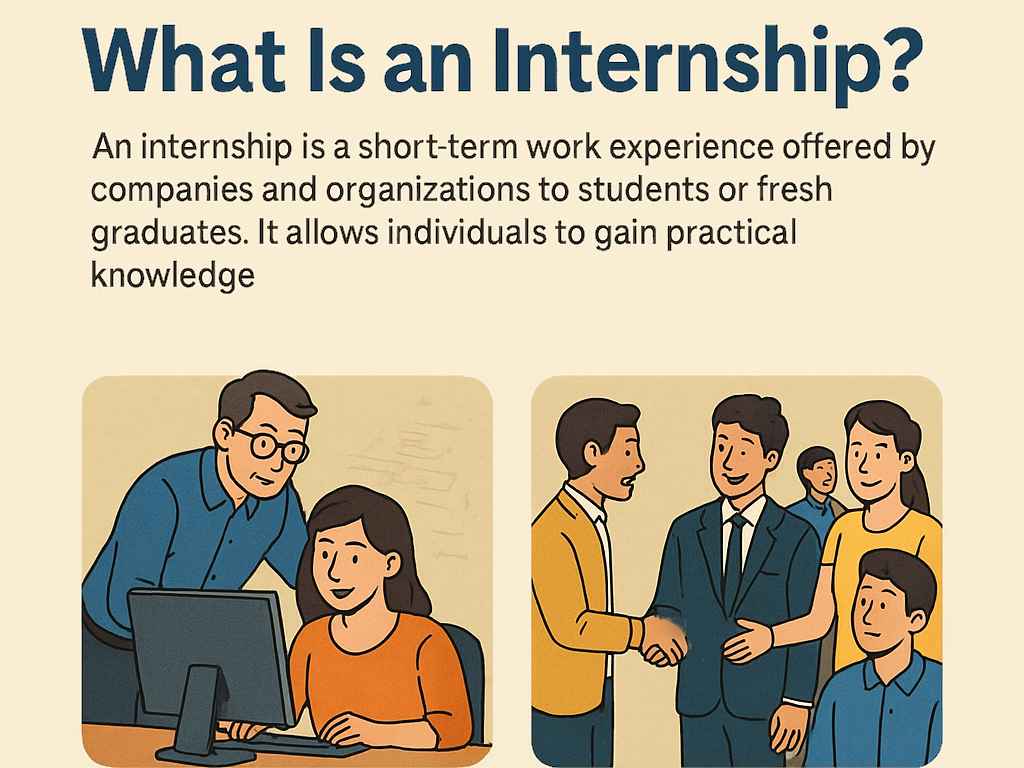An internship is a short-term work experience offered by companies and organizations to students or fresh graduates. It allows individuals to gain practical knowledge, skills, and exposure in a specific field. Think of it like a training period where you’re learning by doing.

Key Features:
- Usually done during or after college.
- Can be paid or unpaid.
- Lasts from a few weeks to several months.
- Helps students apply what they’ve learned in class to the real world.
Purpose of an Internship:
- Learn how a real workplace functions.
- Build professional relationships (called networking).
- Improve communication and teamwork skills.
- Discover if you actually like the career you’re aiming for.
Types of Internships
There are many types of internships, depending on the industry, your goals, and how much time you can commit.
1. Paid Internships
You get a salary or stipend. Common in tech, finance, or big companies.
2. Unpaid Internships
You don’t get paid, but you gain valuable experience. More common in non-profits, media, or startups.
3. Virtual or Remote Internships
You work from home using the internet. Great for flexibility.
4. Part-Time Internships
You work a few hours a week. Good for students who are still studying.
5. Full-Time Internships
You work like a regular employee, usually during summer or after graduation.
6. Academic Internships
Done as part of your college course, and sometimes count for grades or credits.
Benefits of Doing an Internship
Doing an internship can be super helpful, especially when you’re just starting out.
Real-World Experience
You learn how your field really works – not just theory, but practical stuff.
Build Your Resume
Employers love to see internships on your CV. It shows you have some experience.
Learn Skills
You can improve both hard skills (like coding or writing) and soft skills (like communication or teamwork).
Career Clarity
You get a feel for whether the job or field is right for you.
Networking
You meet people who can guide you, give advice, or help you get a job later.
Potential Job Offers
Many companies hire interns as full-time employees after the internship.
How to Get an Internship
Getting an internship takes a bit of effort, but it’s totally doable!
Step 1: Prepare Your Resume
Highlight your skills, education, and any projects or experiences.
Step 2: Write a Good Cover Letter
Tell the company why you want the internship and how you can contribute.
Step 3: Search for Opportunities
Use websites like LinkedIn, Internshala, or your college career center.
Step 4: Apply to Multiple Places
Don’t wait for one response. Apply to many internships to increase your chances.
Step 5: Be Ready for Interviews
Practice answering questions about yourself, your goals, and your knowledge.
Step 6: Learn & Grow
Once you get selected, be curious, take initiative, and learn as much as you can.
Summary:
An internship is a great way for students and recent graduates to gain practical work experience in a field of interest. It can be paid or unpaid and helps individuals develop skills, build resumes, and explore careers. Internships offer real-world exposure, teach valuable lessons, and can even lead to full-time jobs. To get an internship, one needs to prepare a good resume, apply widely, and be ready to learn and grow during the experience.
Tags: academic credit, academic internships, big companies, business environment, career, Career & Education, career advancement, career clarity, career development, career exploration, career goals, career growth, career insight, career networking, career path, career pathway, career preparation, career-focused, college, college career center, Communication, companies, competitive advantage, cover letter, credits, duration, early career, early career exploration, employer expectations, entry-level jobs, experience-based learning, exposure, field-specific knowledge, finance, flexibility, fresh graduates, full-time internships, future career prospects, future employment, goals, grades, growth, hands-on experience, hands-on learning, hard skills, industry, industry connections, industry experience, industry exposure, industry mentors, industry-specific experience., industry-specific skills, initiative, Internshala, Internship, internship application, internship benefits, internship interview, internship opportunities, internship program benefits, Internship programs, internship selection process, internship success.Internship opportunities, internships for college students, internships in different sectors, interviews, job applications, job market, job market competitiveness, job market skills, job offers, job opportunities, job prospects, job readiness, job search, job search strategy, job shadowing, job skills, job training, learning, learning by doing, learning opportunity, LinkedIn, media, mentorship, Networking, non-profits, on-the-job training, organizations, paid, paid internships, part-time internships, personal development, portfolio building, practical application, practical knowledge, professional connections, Professional Development, professional growth, professional networking, professional portfolio, professional relationships, real world, real-world application, real-world experience, remote, resume, resume building, resume enhancement, resume preparation, salary, short-term work experience, skill acquisition, Skill development, skills, soft skills, Startups, stipend, students, team collaboration, teamwork, tech, time commitment, Time Management, training period, transferable skills, unpaid, unpaid internships, virtual internships, work assignments, work culture, work environment, work ethic, work experience, work experience programs, work exposure, work-life balance, workplace, workplace exposure, workplace readiness, workplace skills


